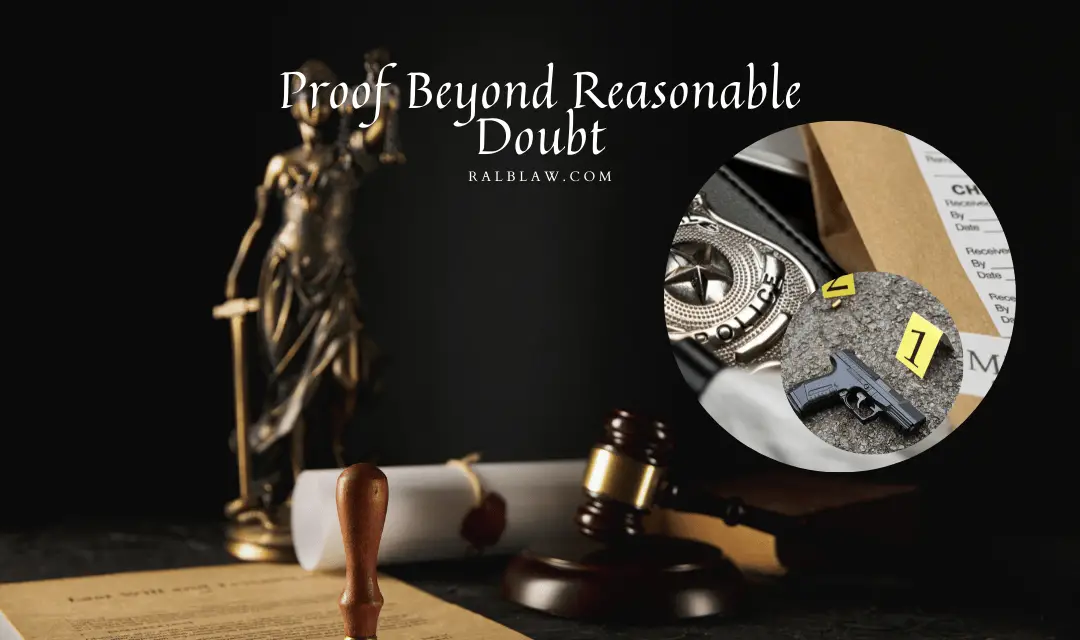It is better to run the risk of sparing the guilty than to condemn the innocent.1 Likewise echoed in England, the law holds that it is better that ten guilty persons escape, than that one innocent suffer.2
The quantum of evidence required under the law to hold a certain individual or persons responsible for a particular crime is high. It should be proof beyond reasonable doubt.
Therefore, if there is even an iota of doubt that will linger in the mind of the Court regarding the evidence presented against the accused, which will necessarily cast suspicions on their veracity in establishing the guilt of the latter, then acquittal will follow.
The result is that the constitutional presumption of innocence has not been overcome. All the more if the accused is really innocent of the crime charged. It will be at the height of transgression and a travesty of justice if an otherwise innocent person will suffer the so called ends of justice.
Why is proof beyond reasonable doubt important in criminal prosecution?
Proof beyond reasonable doubt is important because the Constitution being the highest law of the land protects the right of the people to life, liberty, and property.
No less than the Bill of Rights unequivocally enshrined that no Person shall be deprived of life, liberty, or property without due process of law, nor shall any person be denied the equal protection of the laws.
Furthermore, it is also provided under Section 14 of the same Article that “No person shall be held to answer for a criminal offense without due process of law. “
In all criminal prosecutions, the accused shall be presumed innocent until the contrary is proved.”
Consequently, it is but proper, and in consonance with the fundamental right of a person to due process and also embodying the rights of an accused in a criminal prosecution, that the standard of proof required to pronounce an individual guilty of the crime charge is proof beyond reasonable doubt.
Concept of proof beyond reasonable doubt
As provided in Rule 133, Section 2 of Revised Rules on Evidence, it specifies the requisite quantum of evidence in criminal cases:
Section 2. Proof beyond reasonable doubt – In a criminal case, the accused is entitled to an acquittal, unless his guilt is shown beyond reasonable doubt. Proof beyond reasonable doubt does not mean such a degree of proof, excluding possibility of error, produces absolute certainly.
Moral certainly only is required, or that degree of proof which produces conviction in an unprejudiced mind.
In criminal case, proof beyond reasonable doubt is the standard used in convicting the accused in criminal cases. The Constitution protects the right every person who is to be deemed innocent until proven guilty beyond reasonable doubt. The Constitution provides that “No person shall be deprived of life, liberty, or property without due process of law, nor shall any person be denied the equal protection of the laws.”
In Capistrano Daayata, et al. vs People3 , proof beyond reasonable doubt charges the prosecution with the immense responsibility of establishing moral certainty.
The prosecution’s case must rise on its own merits, not merely on relative strength as against that of the defense. Should the prosecution fail to discharge its burden, acquittal must follow as a matter of course.
Jurisprudence further provides that proof beyond reasonable doubt refers to that degree of proof which, after an examination of the entire records of the case, produces in an unprejudiced mind, moral certainty of the culpability of the accused.
How hard is it to prove a crime beyond a reasonable doubt?
Proof beyond reasonable doubt is indispensable to prevail over the constitutional presumption of innocence. It is incumbent upon the prosecution to discharge the latter in order to convict an accuse in a criminal case.
Being indispensable, it is even hard to prove. However, the prosecution must not lose sight of the principle that crime should pay and must be punished.
Failure to discharge such burden of the presumption of innocence of the accused will result in an acquittal. Hence, the High Court in one case4 expound [broken down into paragraph bits for ease of reading]:
“While not impelling such a degree of proof as to establish absolutely impervious certainty, the quantum of proof required in criminal cases nevertheless charges the prosecution with the immense responsibility of establishing moral certainty, a certainty that ultimately appeals to a person’s very conscience.5
“While indeed imbued with a sense of altruism, this imperative is borne, not by a mere abstraction, but by constitutional necessity:6
“This rule places upon the prosecution the task of establishing the guilt of an accused, relying on the strength of its own evidence, and not banking on the weakness of the defense of an accused.7
“Requiring proof beyond reasonable doubt finds basis not only in the due process clause of the Constitution, but similarly, in the right of an accused to be “presumed innocent until the contrary is proved.”8
“Undoubtedly, it is the constitutional presumption of innocence that lays such burden upon the prosecution.”9
“Should the prosecution fail to discharge its burden, it follows, as a matter of course, that an accused must be acquitted.”10
What is reasonable doubt?
This is the kind of doubt which, when entertained by the Court trying a person accused in a criminal prosecution, shall produce the accused’s acquittal.
According to Henry Campbell Black,11 he defined this, based on existing jurisprudence, as:
“Reasonable doubt which will justify acquittal is doubt based and arising evidence or lack of evidence, and it is doubt which reasonable man r woman might entertain, and it is not fanciful doubt, is not imagined doubt, and it is not doubt that juror might conjure up to avoid performing unpleasant task or duty. U. S. v. Johnson, C. A. N. Y., 343 F.2d 5, 6.”12
“Reasonable doubt is such a doubt as would cause prudent men to hesitate before acting in matters of importance to themselves. U. S. v. Chas. Pfizer & Co., Inc., D. C. N. Y., 367 F.Supp. 91, 101.”13
“Doubt based on reason which arises from evidence or lack of evidence. Johnson v. Louisianan, 406 U. S. 356, 360, 92 S.Ct. 1620, 1624, 32 L.Ed.2d 152.”14
What does the prosecution have to prove?
Taking into account the required quantum of proof to convict an accused, who allegedly committed a crime, felony, or offense, the prosecution should prove with moral certainty each and every element thereof. This is the barest minimum.
The prosecution must show to the Court by means of undeniable evidence, whether direct or circumstantial, that every element of the crime, felony, or offense has been perpetrated by the accused.
Others matters which will be proved in the course of trial may, otherwise, be additional modifying circumstances, in favor of the prosecution and against the accused.
What has been decided
Jurisprudence explains that the presumption of innocence is not meant to be forever. It ends when it is overcome in final conviction.
There is only one type of quantum of evidence which overcomes the above presumption that is the proof beyond reasonable doubt. Without such quantum of evidence, the accused should be acquitted.
If the prosecution fails to meet the required amount of evidence, the defense may logically not even present evidence on its own behalf, in which case, the presumption of innocence prevails and the accused in acquitted.
Prosecution must rest on its own merits to prove guild of the accused. The conviction of the accused must stand on the strength of the prosecution’s evidence, not on the weakness of the defense which the accused put up.
Therefore, it is axiomatic that evidence that should establish the guilt of the accused must always be beyond reasonable doubt. If the evidence of guilt falls short the same requirement, the Court will not allow the accused to be deprived of his liberty.
The acquittal of the accused should come as a matter of course. When the prosecution does not meet the required quantum of evidence, the defense may logically not even present evidence on its own behalf.
The presumption of innocence shall prevail, and the accused shall be acquitted. However, once the presumption of innocence is overcome, the defense bears the burden of evidence to show reasonable doubt as to the guilt of the accused.
For instance, in rape cases the court has constantly been guided by certain principles. Among which is that the evidence for the prosecution must stand or fall on its own merits. It cannot draw strength from the weakness of the evidence for the defense.15
The concept of proof beyond reasonable doubt and the presumption of innocence has given rise to a jurisprudential rule which is referred to as the equipoise rule.
Equipoise rule provides that where the evidence in a criminal case is evenly balanced, the constitutional presumption of innocence tilts the scales in favor of the accused.16
How brilliant it is that the framers of the law protect the life and liberty of the people, especially in criminal cases. The answer will be because of the States vast resources, the same is mobilized against a particular accused or group of them, who by no means are no match with the government’s gargantuan resources.
Thus, the need guarantee the rights of the accused in a criminal prosecution. One of which is the entitlement to presumption of innocence until proven guilty.
Consequently, if the inculpatory facts and circumstances are capable of two or more explanations, one which is consistent with the innocence of the accused and the other consistent with his guilt, then the evidence does not fulfill the test of moral certainty and is not sufficient to support a conviction.17
Every criminal conviction requires of the prosecution to prove one, the fact of the crime that is the presence of all the elements for which the accused stands charged, and two, the fact that the accused is the perpetrator of the crime.
Jurisprudence provides that proof beyond reasonable doubt does not mean such a degree of proof as excluding possibility of error, produces certainty. Moral certainty only is required, or that degree of proof which produces conviction in an unprejudiced mind.18
In all criminal cases, the prosecution is burdened with the duty of establishing with proof beyond reasonable doubt the guilt of an accused.19
The determination of whether the prosecution has fulfilled such a heavy burden is left to the trial court which in turn must be satisfied with moral certainty that an accused has indeed committed the crime on the basis of facts and circumstances to warrant a judgment of conviction.20
Otherwise, where there is reasonable doubt, the acquittal must then follow. The premise is that the accused is presumed innocent until the contrary is proved.
Closing
The presumption of innocence in favor of an accused in a criminal case is a basic constitutional guarantee. It demands that the State must establish the guilt of the person beyond reasonable doubt.
In order for it to accomplish, the prosecution must rely on the strength of its evidence, not on the frailty of his defense. Each reasonable doubt of the guilt of the person warrants to an acquittal.
Burden of proof protects against convictions relying on factual errors. Such helps to support the presumption of innocence.
When the convictions are reviewed upon appeal, the courts must evaluate whether the evidence could reasonably support the guilty verdict beyond a reasonable doubt.
This means that the appellate court must determine whether any court could have found the elements of the crime beyond reasonable doubt.
- Zadig. Voltaire, 1758[↩]
- Justice Blackstone, 1769[↩]
- GR No 205745, March 8, 2017[↩]
- Supra., Daayata, et al. vs. People, G.R. No. 205745, March 8, 2017[↩]
- Ibid.[↩]
- Ibid.[↩]
- Ibid.[↩]
- Ibid.[↩]
- Ibid.[↩]
- Ibid.[↩]
- Black’s Law Dictionary, H. Campbell Black, 6th Edition, p. 1256[↩]
- Ibid.[↩]
- Ibid.[↩]
- Ibid.[↩]
- People vs. Rapiz, G.R.No. 240662, September 16, 2020[↩]
- People vs. Librias, G.R. No. 208067, September 14, 2016[↩]
- People vs. Floresta, G.R. No. 239032, June 17, 2019[↩]
- People vs. Calates, G.R. No. 214759, April 4, 2018[↩]
- Valencerina vs. People, G.R. No. 206162, December 10, 2014[↩]
- Ibid.[↩]




